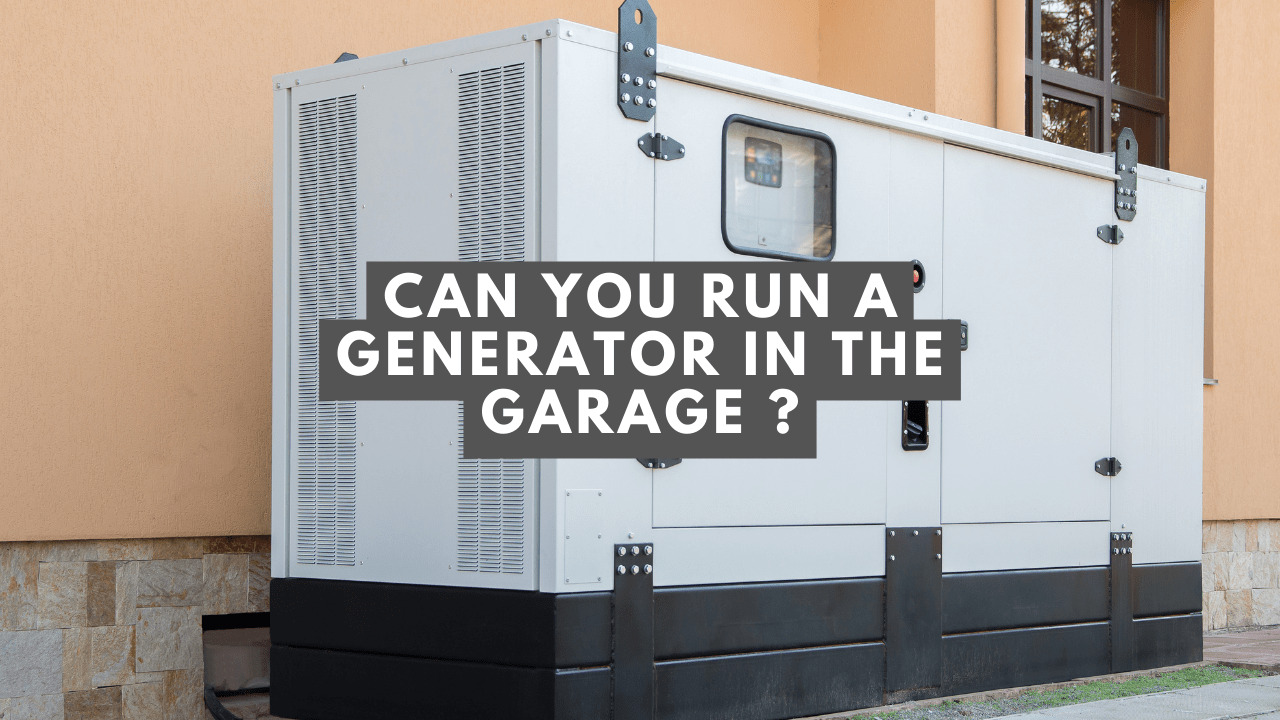Many folks are curious about properly operating a generator in a garage or any other confined place. It’s not easy, and it’s certainly dangerous. However, if you must do so, there is a certain procedure to follow to minimize risk.
Perhaps it’s pouring, and you can’t run the generator outside, or perhaps you want to operate it within for safety concerns.
For whatever reason, many homeowners in states where power outages are common have been wondering about this for years. In this post, you’ll learn whether or not running a generator in your garage is a good idea.
It’s a poor idea to keep a generator running in your garage. Because the carbon monoxide created by the generator is extremely harmful to one’s health, this is the case. To run a generator safely in the garage, you’ll need to create an exhaust extension tube for it and send it to a well-ventilated location outside your home.
Table of Contents
Why Don’t You Run A Generator Indoor?
Carbon monoxide is emitted by the generator when it is running. CO is a colorless and odorless gas that can harm people without their knowledge. Humans can die if their blood contains more than fifty percent carbon monoxide over a long period. There is a lack of ventilation in an enclosed place.
As a result, the carbon monoxide emitted by the operating generator has nowhere to go but inside. Carbon monoxide builds up indoors over time, which is extremely dangerous because this gas is colorless and odorless, making it dangerously easy to miss for ordinary people.
Noise Pollution
It would help if you didn’t run a generator in the garage because of the noise. Generators are well-known for being among the noisiest electrical producers. You’ll be really uncomfortable in my house if there’s much noise coming from your garage.
Maybe the intention was to start the generator so that you could keep using your home’s cooling and heating systems; otherwise, you wouldn’t be able to sleep.
When the generator is turned on, the problem will be solved. However, the generator’s loudness may keep you awake at night. Noise will not be a concern for homes with insulated garage walls and doors, but the generator’s buzzing noise will still be present.
Flammable Particles
Generators generate a great deal of heat as well. As a result, keeping it in a confined space like your garage can cause issues. The majority of garages don’t have adequate ventilation. In most garages, there aren’t any vents or windows. Even if they have windows, the homeowners rarely open them. This is because they are at risk of being robbed.
As a result, the garage may get quite hot and uncomfortable to enter, and the generator may overheat if sufficient ventilation is not provided. As a result, if you operate your generator in the garage, you risk ruining it.
A garage with too much heat might also be dangerous to your home. It has the potential to start a fire. That’s because we keep all of these goods in the garage that can easily catch fire.
Ventilation Is Essential For Running The Generator Appropriately
The importance of ventilation cannot be overstated. Because the exhaust emits dangerous carbon monoxide, you should only use your generator outside, ideally under the protection of an awning. You can run the generator in the garage as long as the door is completely open.
Carbon monoxide can still build up through a cracked window or a broken garage door. If you still want to run the generator in the garage, continue reading:
How To Run The Generator Safely In The Garage?
Running a generator in the garage is dangerous. However, there are times when you simply don’t have a choice. So, here are some suggestions for securely operating a generator in a garage.
1) Install An Exhaust
If you want to run your generator in the garage, the best alternative is to add an exhaust extension. With an exhaust extension installed, all fumes from the generator can be channeled to a safe, well-ventilated region outside your home.
It’s critical to double-check that the extension tube is properly sealing the generator’s exhaust and that there are no leaks.
Furthermore, the extension tube must be placed as far away from your house as practicable. You could also run it to the roof using a plumbing vent. To prevent precipitation from entering the generator’s exhaust, make sure the plumbing is firmly covered.
2) Go For Better Ventilation System
When you wish to run the generator in your garage, another alternative is to open the garage door and windows. You must provide as much air as possible in the garage to avoid fumes from accumulating. The harmful gases from the generator will be exchanged with natural air by opening the garage door and windows.
This isn’t the greatest route to take. This is because even if the gases escape the garage through the windows and garage door, they can still enter your home. You also make your home vulnerable to burglars. They may easily walk into your garage with your door wide open, grab everything they want, and flee.
Conclusion
Finally, it is not safe to operate a generator inside a garage or any other enclosed location. Because you usually only use a generator when it’s necessary, you have plenty of time to prepare right now. If you can’t get a vent out of the garage wall, open all the windows and try to pipe it through one of them.
In any case, none of this is particularly secure. If at all possible, you should utilize the generator outside. If not, you should always rant! Carbon monoxide is the sole harmful gas. You’ll be fine once you’re outside and up in our gorgeous environment.





